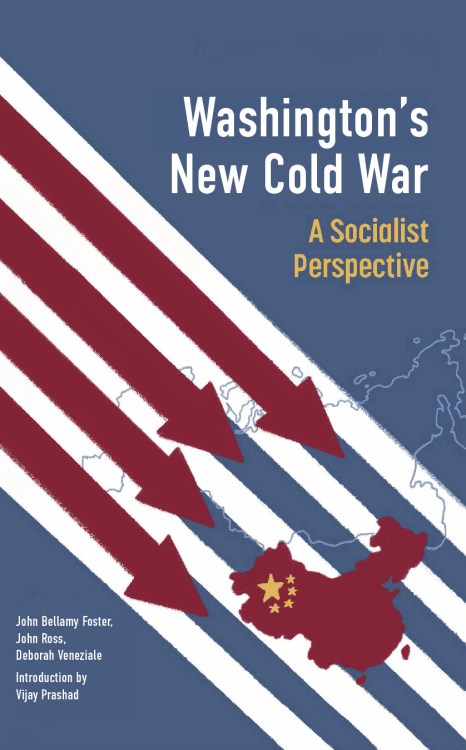Human destiny in Ukraine (Washington’s New Cold War, in ‘Counterpunch’)
Washington’s New Cold War
By John Bellamy Foster, John Ross,
& Deborah Veneziale
with an introduction by Vijay Prashad
15$ / 108 pages / 978-1-68590-000-7
Review by Eve Ottenberg-Stone
…Russian leaders believe, probably correctly, that this is a fight for their survival. Ukrainian leaders, ditto – except there’s no “probably” about it; it’s definitely. And it is pointless to attempt to judge those leaders under such circumstances. But for American leadership, this is a proxy war. It is not existential. It is a proxy war of choice. That’s what makes the U.S. role, instigating and prolonging it, so horrible.
President Biden and his neocons – secretary of state Antony Blinken, undersecretary of state Victoria Nuland, national security advisor Jake Sullivan – all knew damn well that expanding NATO into Ukraine would provoke Russia into a war. They knew because top advisors had said so for generations and because the Russians told them so for decades. The only conclusion is that they wanted this conflict – something no person of any compassion, decency or humanity could want. Given reports that the Biden team’s plans to blow up the Nordstream pipelines predated Russia’s invasion by several months, it sure looks like these neocons engineered this war without a scintilla of regret for the lives it would claim. But maybe they’re not to blame. The job description demanded sacrificing the supposedly irrelevant virtues of compassion, decency and humanity and so they, along with presidents Clinton, Obama, Trump and Bush are just merely deficient. When they leave office, some will repent of the blood they shed. Others won’t. Maybe that means something for them personally. It doesn’t matter. Their actions speak for themselves. The dead stay dead….
As John Ross writes in a new book, Washington’s New Cold War, coauthored with Deborah Veneziale and John Bellamy Foster, since the U.S.-backed coup in Kiev in 2014, Washington has prepared for war against Russia in Ukraine, thrusting the human future into a crucible for superpower conflict centered on Kiev. “The strengthening of [Ukraine’s] military power alongside powerful fortifications erected near Donbass indicates the U.S. intention to initiate a conflict in the region.”
Such a war differs dramatically from Washington’s assaults on small, relatively undeveloped countries like Iraq, Syria or Vietnam. “Ukraine Is a Qualitative Escalation of Military Aggression by the United States,” reads one of Ross’s subheadings, before he argues that Washington undermines the One China policy just as it crossed Russian red lines in Ukraine. Ross regards these provocations as a trend – of U.S. military escalation – that will continue. I hope he’s wrong.
Only one thing can stop this trend, Ross argues, and thus prevent a nuclear blowout for good: the weakening of the U.S. Ross observes that the long, slow loss in Vietnam led, in 1972, to the U.S. opening to China, followed by détente with Russia. In other words, the Vietnam failure made Washington elites conciliatory. But there exist threatening differences today. This is a “very dangerous period for humanity.” It is “one in which the U.S. may attempt to compensate for its relative economic decline through its use of military force…More precisely, the danger to all countries is that the United States has not lost military supremacy.”
This book cites two lessons from events leading to the Ukraine war: “First…it is pointless to ask the United States for compassion. Second…the outcome of the war in Ukraine is crucial not only for Russia but for China and the entire world,” because “there is no level of crime or atrocity to which the United States is not prepared to descend.” Or as Veneziale puts it, “the depravity of some aspects of current U.S. policy.” What Foster refers to as exterminism. You get the idea. It’s part of our rulers’ job description. You have to adopt policies of ruthless, amoral killing – even if you don’t want to! Meanwhile U.S. failure, NATO failure, might have the unintended benefit of persuading Kiev’s leadership to negotiate with Moscow’s.
The more successful the U.S. is militarily, according to this book, “the more aggressive it will become; the more it is weakened, the more conciliatory it will become.” That is the road human destiny travels in Ukraine. Either the U.S. abandons its insane quest for global hegemony and accepts diplomacy and compromise, or it will proceed on its lethal course, ready and perhaps willing to risk nuclear annihilation of earth’s people, in which case Washington will have enabled the extirpation of humanity, something long, long feared by those who view that city as a monstrous citadel of fascism, whose ultimate aim is utterly, profoundly, anti-human.
Read the full article at Counterpunch

